Samsung 860 QVO SSD review: Big capacity on the cheap, and fast the majority of the time - spiekerareast
At a Glance
Skilful's Rating
Pros
- Great be per gigabyte in big capacities
- Available in adequate to 4TB capacity
- A svelte 7mm thin
Cons
- Continuous pen velocity plummets to 70MBps after secondary cache is exhausted
Our Verdict
In the 2TB and 4TB capacities, this SATAa 6Gbps SSD is a lot cheaper than the competition. It's also a very fast reader, and a fast writer—until it runs out of cache. At the 1TB stratum however, in that location are cheaper drives that don't unwind level when authorship large data sets.
Samsung's 860 QVO SSD is an superior everyday performer and an outstanding steal in its 2TB and 4TB flavors. It's also the second quad-point cell (4-bit) SSD to slide by our portals, the other being Intel's SSD 660P.
The reason out I mention this competitive driving force from Intel up-front is that it's becoming clear that 4-bit NAND, while allowing greater electrical capacity, also extracts a execution hit that vendors must work around. How well a vendor does that affects which 4-bit drive you should buy, and whether you might be better off with an MLC or TLC drive.
Remark: Samsung refers to the 860 QVO Eastern Samoa 4-bit MLC. As the acronym MLC stands for "Multi-Level Cadre," this is technically even up. Notwithstandin, most touch to IT as quad-level cell Beaver State QLC, which is what I take the Q in QVO stands for.
Design and features
The 860 QVO is a 2.5-inch, 7mm thick, SATA 6Gbps SSD. It's a lighter shade of gray than most of Samsung's SSDs, and testament be free in four capacities: 1TB, 2TB, and 4TB. That last is a blessing of 4-bit NAND: greater information density than 3-bit TLC, so you can fit Sir Thomas More data in the same figure of chips.
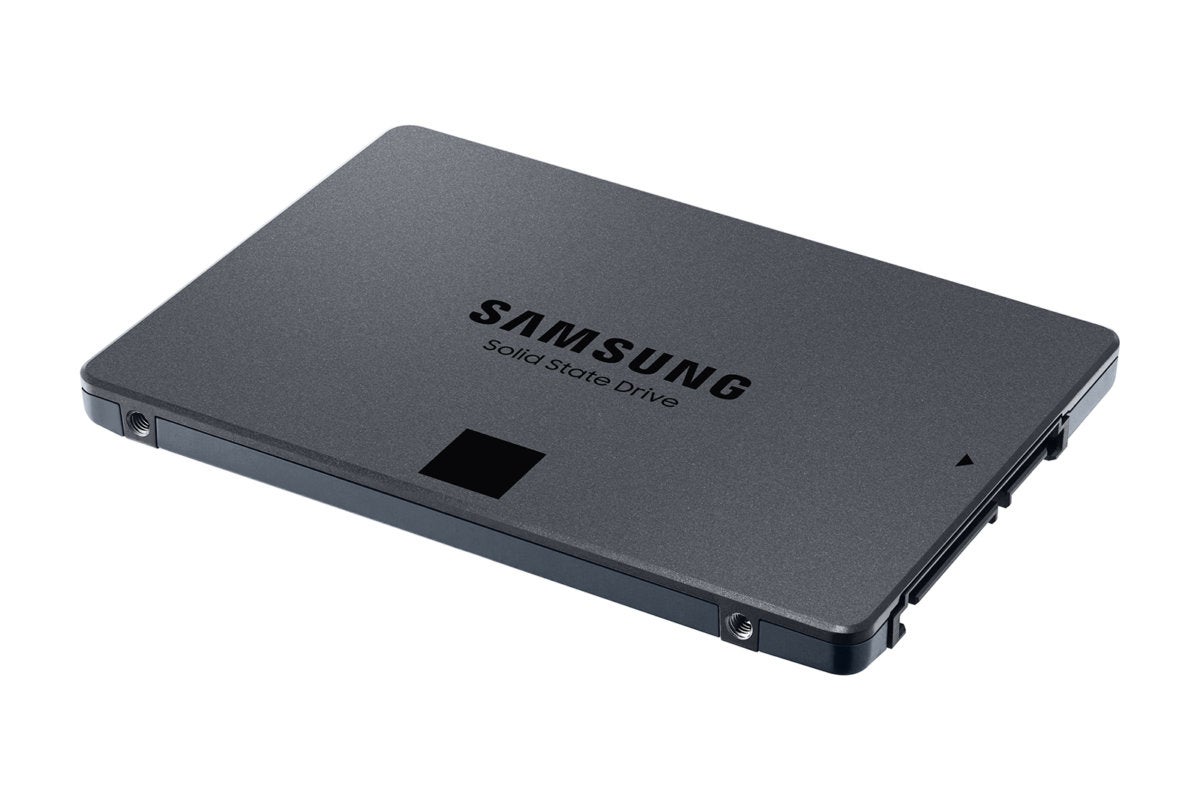 Samsung
Samsung The 860 QVO is thin, lighted, and a bargain in its 2TB and 4TB capacities.
The drive provides 1GB of DRAM cache for each 1TB of capacity. The TBW (TeraBytes Statute) rating is 360TB for every 1TB of capability. The 1TB version I tested has approximately 42GB of available minor cache (QLC, written as SLC or MLC). The 2TB and 4TB drives each get 78GB of cache.
Pricing starts at $150 for the 1TB drive. The 2TB comes in at $300, and the 4TB mould costs $600. A 4TB SSD for $500 is filth-two-a-penny compared to everything else along the market, besides as what you would've square only last year.
Performance
The plain fact of the matter is that composition more bits to a NAND cadre takes more time. It's not that SLC NAND cells are much faster than TLC or QLC cells, information technology's that writing single one bit is faster. Write only when one bit to TLC or QLC, and they're nearly equally fast. Write three or four bits, and they're non even close. Hence a certain amount of the TLC (or QLC in this case) of any SSD is curable as SLC operating theater MLC to fles a secondary stash.
Using this secondary hoard—again, approximately 42GB—the 860 QVO proved a rattling good performer in most circumstances, as you can tell from the benchmark results below. In that location were no performance slowdowns until our 48GB file away copy tests, in which the last 4GB or so wrote at only 70MBps. This would not occur in the 2TB or 4TB drives, with their much liberal Tier 2 cache.
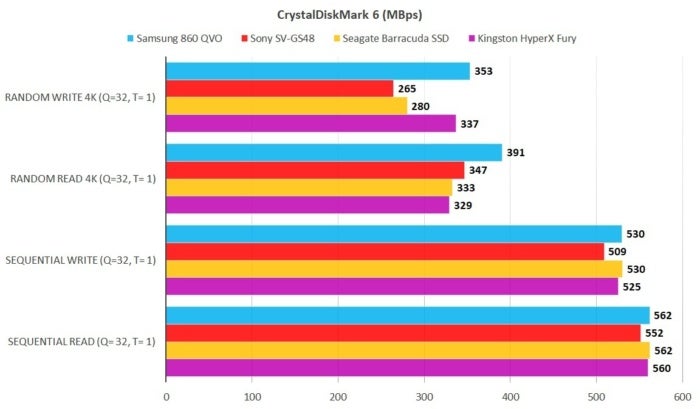 IDG
IDG The 860 QVO (blue bars) is more than competitive with other drives in CrystalDiskMark 6. Longer bars are better.
AS SSD 2.0 had about the assonant opinion as CrystalDiskMark about the 860 QVO's speediness. Note that this test International Relations and Security Network't as optimistic most the throughput, erring slightly on the low side of what we construe with in our real-world, 48GB copy tests.
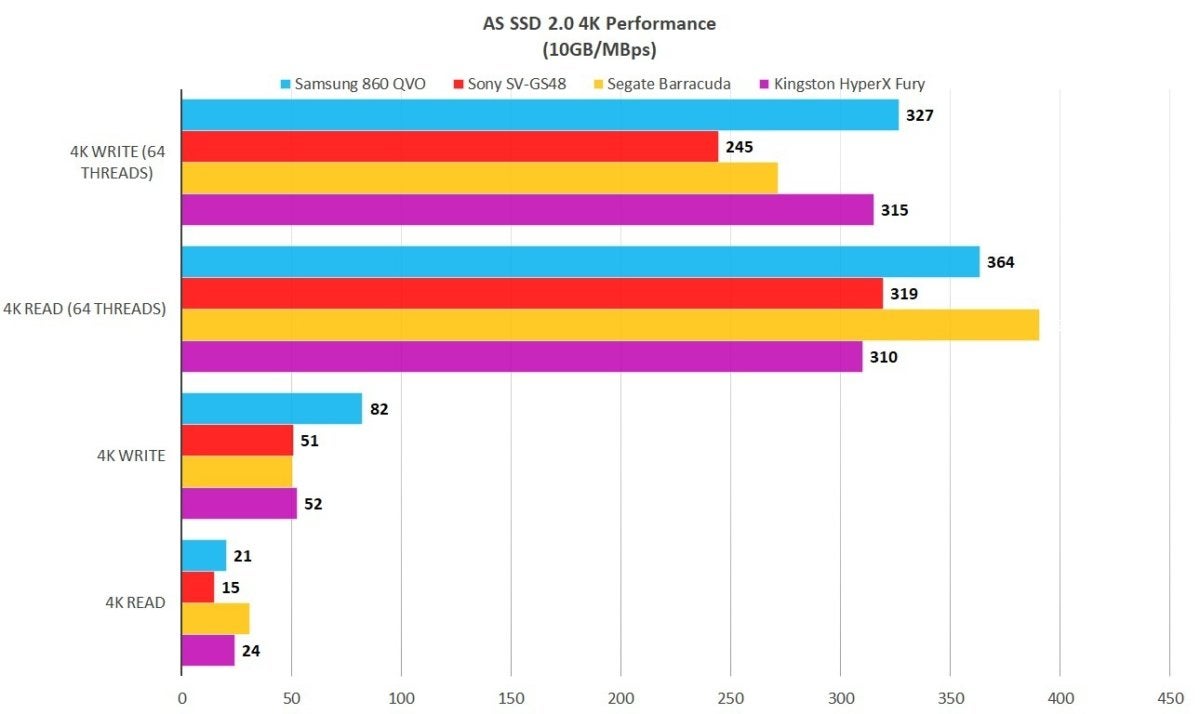 IDG
IDG AS SSD largely agreed with CrystalDiskMark: The 860 QVO (blue bars) is fast low most circumstances. Longer bars are better.
Seek multiplication, arsenic shown below, are actually quite quick compared to nigh SATA 6Gbps SSDs. This Crataegus laevigata possess something to do with the previously described and generous allotment of DRAM cache.
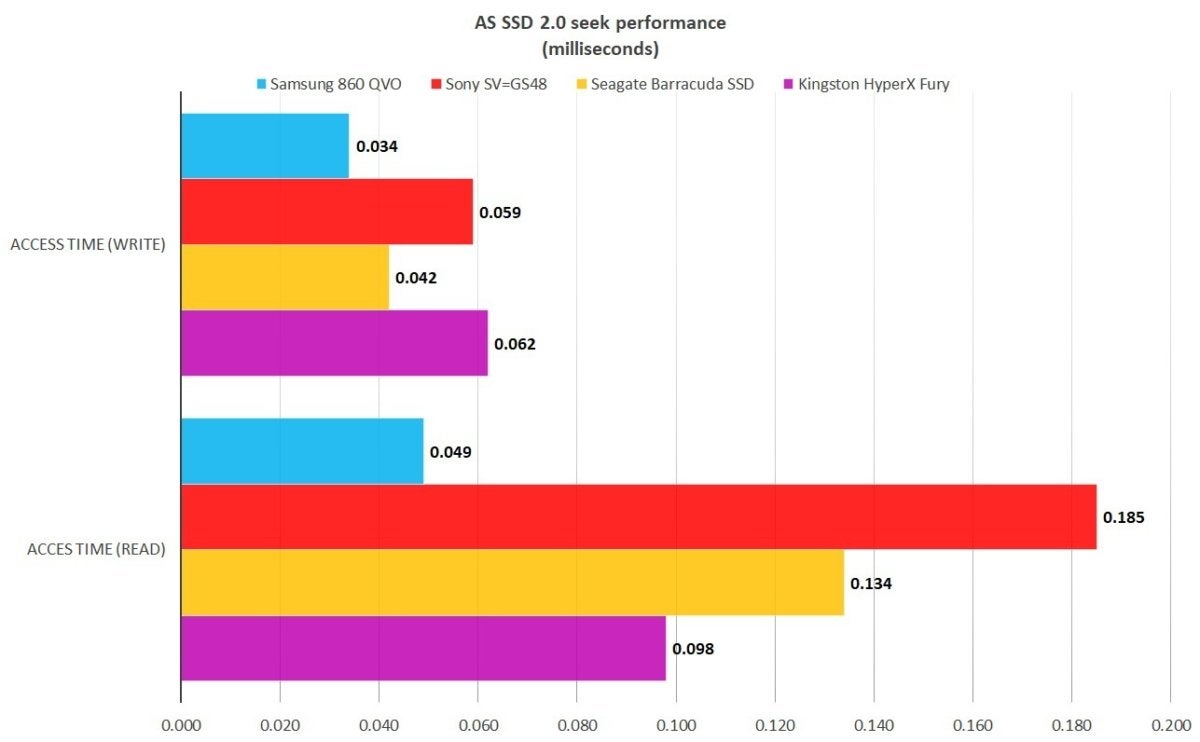 IDG
IDG The 860 QVO's (downcast parallel bars) seek times plane faster than you'd expect from a SATA 6Gbps SSD. Shorter bars are better.
Below you can construe that the simulate tests were but mildly affected by the 860 QVO's running knocked out of hoard, but that was alone because such a diminutive amount of data was handwritten to the main body of QLC store. Double this test size up, and the 1TB 860 QVO and Jamaican capita's parallel bars would've been far longer than the Sony's or Seagate's. Even the 2TB and 4TB capacities would run dry therein scenario.
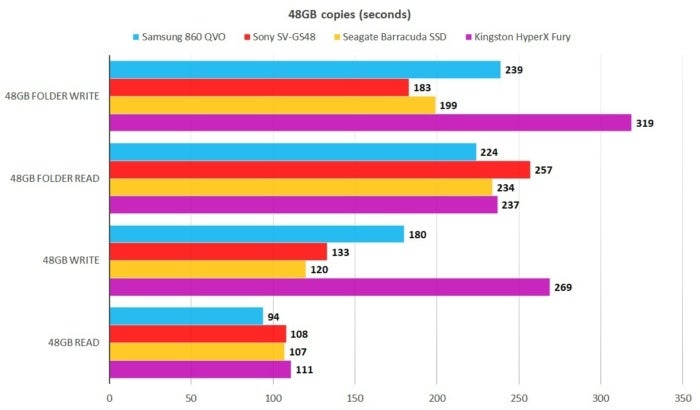 IDG
IDG The area where the 860 QVO (blue bars) waterfall short is in writing large amounts of data, a trait it shares with the Capital of Jamaica HyperX Fury (purple bars). The more than information you write, the worsened the times will equal. The pace of the 860 QVO hovers around 70MBps once the cache is overwritten. Shorter bars are better.
When the 860 QVO runs out of stash, it's pretty depressing. The drive will clear the lay away by writing the data to the main body of 4-bit NAND, but that process takes a piece. I waited a good ten minutes betwixt tests. On a lower floor you send away fancy what happened when I didn't wait that long to try copying 48GB combined more time. The seminal 48GB copy didn't slow dispirited until almost the 90-percent mark.
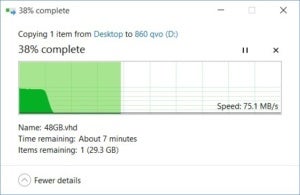 IDG
IDG This is what IT looks like when the 860 QVO slows down. Note that this is a second imitate. The initial 48GB didn't slow down until some 90% of the way through the copy.
Just by way of comparison, in terms of continuous throughput, we've seen hard drives clock 250MBps. But even when writing slowly, SSDs retain their topnotch-fast seek times. Also take down, this is stringently about writing. NAND read speeds in SATA SSDS remain quick no matter what the number of bits organism read.
A good get for the mainstream user
The 860 QVO is a heavy SSD nearly of the time, only there are a number of cheaper 1TB competitors that don't slow down. The 2TB and 4TB drives, connected the some other hand, are a couple of hundred dollars less than the competition and don't nightfall out of cache nearly as presently. That's a big-enough price remainder that I'd view the trade-off, which bequeath vary in balance conditional your of necessity, worthy.
Bargain or non, jazz that you will visit a monumental drop-off in performance when the get runs tabu of cache. It doesn't run out often, just it's ugly when it does.
Source: https://www.pcworld.com/article/402952/samsung-860-qvo-ssd-review.html
Posted by: spiekerareast.blogspot.com


0 Response to "Samsung 860 QVO SSD review: Big capacity on the cheap, and fast the majority of the time - spiekerareast"
Post a Comment